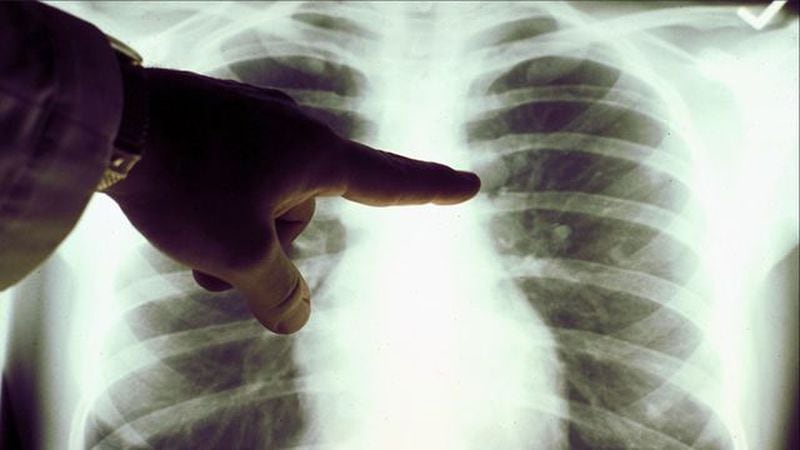Nearly a month after her death, health authorities are confirming that a Decatur woman who attended a conference at the Sheraton Atlanta succumbed to heart disease aggravated by a bacteria possibly picked up at the hotel.
While Cameo Garrett, 49, died of coronary artery disease, “We can’t ignore Legionella was a contributing factor,” DeKalb County Medical Examiner Pat Bailey said Tuesday. The Legionella bacteria causes Legionnaires’ disease.
The Courtland Street hotel shut down voluntarily last month while investigators began looking for the source of a Legionnaires' outbreak that, according to the state department of public health, now totals 12 confirmed cases and 61 probable cases.
MORE: What is Legionnaires' disease? FAQs about the severe form of pneumonia
The probable cases have not been confirmed in a lab, but they include people with illnesses consistent with Legionnaires’ disease, such as pneumonia, the health department said in a news release. This is the first reported death linked to the outbreak.
Air conditioning units are prime breeding grounds for the bacteria, which can multiply in water fountains and ice-making machines, as well. Most people get sick when they breathe in mist or steam and the bacterium makes its way into the lungs.
Garrett's father, Al Garrett, told Channel 2 that his daughter attended a service organization conference at the Sheraton Atlanta Hotel on June 29. He said she experienced stomach and intestinal problems afterward, and her friends brought medicine to her. After not getting a response from a text message on July 4, Al Garrett drove from his home in Augusta to check on his daughter. He and a friend found her dead in her bedroom on July 9, according to Channel 2.
About one in 10 people who come down with Legionnaires’ disease die due to complications from the illness, the Centers for Disease Control and Prevention said. People who are older than 50, have medical conditions such as chronic obstructive pulmonary disease or diabetes, or have a history of smoking are the most likely to face complications.
Credit: WSBTV.com
Credit: WSBTV.com
Until testing is complete, health officials said they can’t be sure that the hotel is the source of the outbreak, though no other locations are being tested for Legionella. The Sheraton Atlanta will remain closed until at least Sunday but may remain closed for several weeks longer, depending on the test results and whether remediation is necessary.
Andrea Holden, a spokeswoman for the Sheraton Atlanta, said the hotel made the decision to close on July 15 – the same day they learned from the Georgia Department of Public Health that three hotel guests had contracted Legionnaires’ disease. She said the hotel will release the results of the testing once it’s completed.
The Department of Public Health and Fulton County Board of Health investigators have been reviewing hundreds of survey responses from people who stayed or visited the hotel between June 12 and July 15. It could take weeks to parse through the surveys, comparing activities between those who got sick and those who didn’t, the health department said. The survey is available on the agency’s home page.
When testing hotels for Legionella bacteria, investigators typically begin with pools, hot tubs and water fountains, the most likely culprits of the bacterium, health department spokeswoman Nancy Nydam said.
The investigation can expand well beyond those water sources, stretching into a hotel’s water supply system, including the plumbing system, she said.
The team of investigators is looking for clues — such as whether all of the sickened guests stayed on the same floor — that could help find the source of contamination.
Credit: JOHN SPINK / JSPINK@AJC.COM
Credit: JOHN SPINK / JSPINK@AJC.COM
In an e-mailed statement, Sheraton Atlanta general manager Ken Peduzzi said the hotel continues to work closely with public health officials and environmental experts. He said the hotel has “voluntarily moved ahead with precautionary remedial activities while awaiting results.” He didn’t elaborate on the remedial efforts.
Legionella bacteria are found naturally in freshwater environments, like lakes and streams, according to the CDC. But, the agency says, it can become a health concern when it grows and multiplies in building water systems.
The Georgia Department of Public Health is asking all guests who stayed at the Sheraton Atlanta between June 12 and July 15 to fill out online survey on its home page. (http://sendss.state.ga.us/survey/form/11178). The responses will assist in the investigation into the outbreak of Legionnaires' disease.
Legionnaires’ disease
What is Legionnaires’ disease?
It’s a severe form of pneumonia, or lung inflammation, caused by a bacterium known as Legionella.
How does it spread?
You can’t catch Legionnaires’ disease from person-to-person contact. Instead, most people get the disease from inhaling the bacteria. Older adults, smokers and people with weakened immune systems are especially susceptible.
What are the symptoms?
Legionnaires’ usually develops two to 10 days after exposure to the bacteria and often begins with these symptoms: headache, muscle pain, chills and a fever that may be 104 degrees or higher. By the second or third day, other symptoms may include cough, shortness of breath, chest pain, gastrointestinal symptoms and confusion or other mental changes. Left untreated, it can be fatal.
How is it treated?
Prompt treatment with antibiotics usually provides the cure, but some people continue to experience problems after treatment.
SOURCE: MAYO CLINIC
About the Author









